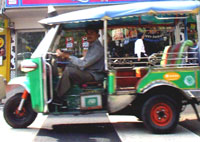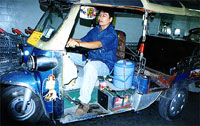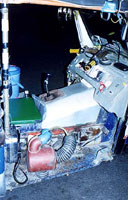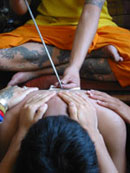Talking About Tuk-Tuks
Nowadays a tuk-tuk symbolises Thailand almost as much as an elephant. Sometimes also referred to incorrectly but affectionately as ‘toot-toots’ and ‘tut-tuts’ by visitors, these adorable little three-wheeled taxis get their name from the not-so-adorable sound their motorcycle-like engines make.
Tuk-tuks provide fast and sometimes nerve-wracking rides through clogged streets. While riding in a tuk-tuk, I am usually half-convinced it is going to flip over. I am relieved and surprised when it does not. I find tuk-tuks to be downright huggable except while I am riding in one.
Tuk-tuk drivers don’t have an easy time of it. They sit in polluted streets all day with no windows to put up. Their vehicles do not provide them much protection in case of an accident or rain. There is also a lot of competition for passengers.
I recently talked to 40-year-old Tanaporn about the ins and outs of tuk-tuk driving. When I met up with him, he had been waiting in line for three hours outside a shopping centre and hadn’t had a customer yet. He was in queue with seven other tuk-tuks and had made it to the third in line. “I’ll make my money in the evening. That is when the markets will get very busy.”
three hours outside a shopping centre and hadn’t had a customer yet. He was in queue with seven other tuk-tuks and had made it to the third in line. “I’ll make my money in the evening. That is when the markets will get very busy.”
He’s been driving his very own beat-up tuk-tuk, which he bought used for 170,000 baht (3,777 US dollars), for ten years. He can make 300 baht profit (6.66 US dollars) in one day after paying 150 baht for gas. If he works every day, he can take home 8,400 baht (186 US dollars) per month. He averages 40 baht (0.88 US dollars) per ride.
Tanaporn works just outside of Bangkok in a province called Nonthaburi. Tuk-tuks registered in Bangkok can drive anywhere they please. Tanaporn’s opinion on this is: “If Bangkok drivers can drive here, I should be able to drive there!” There is a plus side to working outside of Bangkok, though. “The air out here is not as bad as in the city but it is still pretty bad.”
Tanaporn is the father of three children (aged 20, 12, and 10). They all attend school and the family lives with his mother and father in a three-room house. When asked about finances, he proclaimed, “I don’t know how much anything costs. My wife takes care of all my money.” The group of fellow tuk-tuk drivers that had assembled around us chuckled. When asked the maximum speed a tuk-tuk can travel there was much chatter. Everyone finally agreed upon 60 k.p.h. (37 m.p.h.).
three children (aged 20, 12, and 10). They all attend school and the family lives with his mother and father in a three-room house. When asked about finances, he proclaimed, “I don’t know how much anything costs. My wife takes care of all my money.” The group of fellow tuk-tuk drivers that had assembled around us chuckled. When asked the maximum speed a tuk-tuk can travel there was much chatter. Everyone finally agreed upon 60 k.p.h. (37 m.p.h.).
The most difficult thing about being a tuk-tuk driver according to him is… “All of the waiting. I get bored.” His remedy? “I read the newspaper, listen to music and I sleep a lot.” When he needs money, his days can start at 3 a.m. and end at 7 or 8 p.m. “When I finish work, I am really tired. I work every day,” he told me.
The strangest thing that he has ever transported in his tuk-tuk was “many dogs accompanied by their owner.” Tanaporn said that up to ten school children have fit in the back for a ride.
ride.
When asked if he’s ever had non-paying customers, he stated, “It has happened to me two times. They said to wait while they went to get the money but they never came back.”
Tuk-tuk drivers have the reputation of over charging tourists. When asked about this he exclaimed, “I charge them the same price as I do Thais! Having tourists come to Thailand is good because they bring money with them.”
